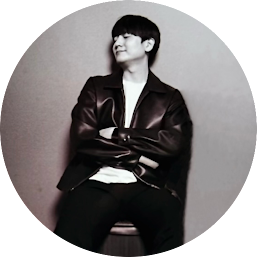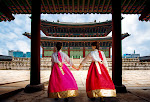 |
| Jeonju Hanok Village |
From Hanok Houses to Culinary Delights: Unveiling the Wonders of Jeonju Hanok Village
Are you planning a trip to South Korea and looking for an offbeat destination that is rich in history, culture, and tradition? Look no further than Jeonju Hanok Village, a small neighborhood in Jeonju city that is famous for its traditional Korean houses, local delicacies, and vibrant art scene. In this post, we will take a closer look at what Jeonju Hanok Village has to offer and why it is worth a visit for any traveler.
What is Jeonju Hanok Village?
Jeonju Hanok Village is a historic neighborhood located in the heart of Jeonju city in North Jeolla province, South Korea. The village is known for its well-preserved traditional Korean houses, known as "hanoks," that date back to the Joseon dynasty (1392-1910). The neighborhood covers an area of approximately 800 meters by 700 meters and is home to over 800 hanoks, many of which have been converted into guesthouses, restaurants, cafes, and shops.
Getting to Jeonju Hanok Village
Jeonju Hanok Village is easily accessible by public transportation from major cities in South Korea. The fastest and most convenient way to get there is by taking the KTX (Korea Train Express) from Seoul Station to Jeonju Station, which takes approximately 2.5 hours. From Jeonju Station, you can take a local bus or a taxi to the Hanok Village. Alternatively, you can take a bus from major cities such as Busan, Daegu, or Gwangju to Jeonju Intercity Bus Terminal and then take a local bus or a taxi to the village.
Things to do in Jeonju Hanok Village
- Explore the Traditional Hanoks: The main attraction of Jeonju Hanok Village is its traditional hanoks, which have been beautifully restored and preserved over the years. You can wander through the narrow alleys and admire the unique architectural features of the hanoks, such as their tiled roofs, wooden pillars, and decorative doors.
- Visit the Jeonju Hanok Village Museum: The museum is located in the heart of the village and showcases the history and culture of Jeonju Hanok Village. You can learn about the different types of hanoks, their construction techniques, and the lifestyle of the people who used to live in them.
- Try the Local Food: Jeonju is known for its delicious and diverse food culture, and Jeonju Hanok Village is no exception. You can sample a variety of traditional dishes such as bibimbap (a rice dish with mixed vegetables and meat), kongnamul gukbap (a bean sprout soup with rice), and makgeolli (a rice wine). You can also visit the street food stalls and try some of the local snacks such as hotteok (a sweet pancake with brown sugar filling) and hwangnam-ppang (a fish-shaped bread with sweet red bean filling).
- Enjoy the Arts and Culture: Jeonju Hanok Village is home to many art galleries, museums, and theaters where you can experience the local art and culture. You can visit the Jeonju Traditional Culture Center, which offers various cultural programs and workshops, or watch a performance at the Jeonju National Theater.
- Shop for Souvenirs: There are many souvenir shops in Jeonju Hanok Village where you can buy traditional Korean handicrafts such as pottery, textiles, and paper products. You can also find unique items such as hanbok (traditional Korean clothing), accessories, and beauty products.
Best Time to Visit Jeonju Hanok Village
The best time to visit Jeonju Hanok Village is during the spring and fall seasons, when the weather is mild and the foliage is at its peak. The cherry blossom season in early April is a popular time to visit, as the village is adorned with pink blossoms that create a picturesque backdrop. The fall season from late September to early November is also a great time to visit, as the foliage turns into a beautiful array of colors, making for a stunning view.
Where to Stay in Jeonju Hanok Village
One of the unique features of Jeonju Hanok Village is the abundance of traditional hanok guesthouses, which offer a unique and authentic accommodation experience. Many of the hanoks have been converted into guesthouses that feature modern amenities while retaining their traditional charm. Staying at a hanok guesthouse allows you to immerse yourself in the local culture and lifestyle, as well as enjoy the tranquility and serenity of the village.
 |
| Jeonju Hanok Village |
Conclusion
Jeonju Hanok Village is a hidden gem of South Korea that offers a glimpse into the country's rich cultural heritage. From exploring the traditional hanoks to trying the local food and experiencing the arts and culture, there is something for everyone in this charming neighborhood. If you are looking for an offbeat destination that is away from the hustle and bustle of the big cities, then Jeonju Hanok Village is the perfect place for you.
FAQs
- Is Jeonju Hanok Village open year-round? Yes, Jeonju Hanok Village is open year-round, although some shops and restaurants may have different operating hours during the off-season.
- How much time should I spend in Jeonju Hanok Village? You can easily spend a full day exploring Jeonju Hanok Village and its attractions. If you want to experience the local culture and lifestyle, you can also consider staying overnight at a traditional hanok guesthouse.
- Are there any events or festivals in Jeonju Hanok Village? Yes, Jeonju Hanok Village hosts various events and festivals throughout the year, such as the Jeonju Hanji Culture Festival, the Jeonju Bibimbap Festival, and the Jeonju International Film Festival.
- Can I wear a hanbok in Jeonju Hanok Village? Yes, many hanok guesthouses offer hanbok rental services, and you can wear a hanbok while exploring the village. It is a fun and unique way to experience the local culture and take memorable photos.
- What other attractions are there in Jeonju city? Jeonju city has many other attractions besides Jeonju Hanok Village, such as the Jeonju National Museum, the Pungnammun Gate, and the Gyeonggijeon Shrine. You can also explore the local markets and shopping areas to experience the vibrant city life.











0 Comments